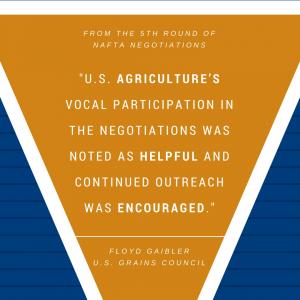Negotiators from the United States, Canada and Mexico completed the fifth formal round of negotiations for the North American Free Trade Agreement (NAFTA) before Thanksgiving in Mexico City, with accelerated discussions reflecting the urgency to conclude negotiations in early 2018.
This round of talks was an intercessional round, meaning the trade ministers from the three countries did not attend. Negotiators made progress on the sanitary and phytosanitary, customs and trade facilitation, telecommunications, good regulatory practices, anticorruption, market access for goods, technical barriers to trade and digital trade chapters, as well as sectoral annexes, but did not close any chapters.
“Canadian and Mexican negotiators refrained from countering many of the most controversial U.S. proposals in this round but did make significant progress on more technical issues,” said U.S. Grains Council Director of Trade and Biotechnology Floyd Gaibler, who attended the negotiations.
“While a number of issues still do not have a visible path for resolution, talks continue, and the Council continues to urge for continued, strong support for the market access provisions in the agreement.”
Specific to agriculture, the three countries worked on the SPS measures chapter to enhance it with fully enforceable language similar to what was in the Trans-Pacific Partnership (TPP) text. Proposed language includes provisions to ensure import checks for SPS requirements are based on actual potential risk and encourage expeditious resolution of SPS matters based on science-based solutions. (Learn more about these types of SPS mechanisms here.)
Progress also continued on a good regulatory practices chapter that would promote greater regulatory compatibility, particularly on biotechnology authorizations and maximum residue levels (MRLs) for pesticides. Negotiators made significant progress on biotech approvals beyond what the three countries agreed to as part of TPP. The transparency measures for new biotech approval applications in TPP established a new procedure for handling trace amounts of an unauthorized biotech trait and created a working group to discuss biotech trade issues. NAFTA’s biotech provisions could go even further based on mutual interest and preparation from all three countries.
Negotiators did not advance the U.S. NAFTA proposal enabling seasonal produce growers to seek antidumping and countervailing duties, to which Mexico remains fully opposed.
The sixth round of negotiations, another intercessional round without ministerial involvement, is scheduled for Dec. 11 to 15 in Washington, D.C.
While in Mexico, Gaibler also participated in side meetings with Mexican and U.S. government officials as well as the U.S. Chamber of Commerce and the livestock representatives of the Mexican National Agriculture Council (CNA).
“U.S. agriculture’s vocal participation in the negotiations was noted as helpful and continued outreach was encouraged,” Gaibler said. “The Council will continue its outreach efforts with Mexican and Canadian representatives from the livestock, agri-food trade and food products industries.”
The Council continues to support the success of NAFTA, sending organizational leaders to Mexico this week as part of joint officers missions with the National Corn Growers Association (NCGA). Learn more about the importance of NAFTA to U.S. feed grains and co-products here.


